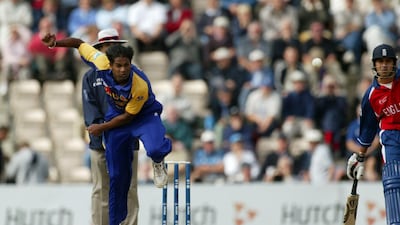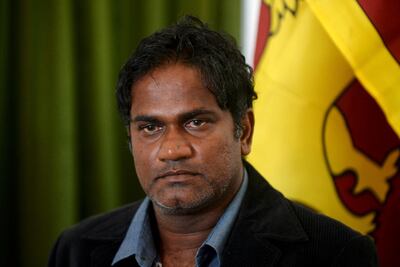Nuwan Zoysa, the former Sri Lanka bowler, has been banned from all cricket for six years for corruption.
The former left-arm fast bowler was found guilty of three breaches of the sport’s anti-corruption code.
The most serious of the charges related to him approaching a player to fix aspects of international matches involving Sri Lanka.
In addition to that guilty verdict, Zoysa remains under investigation for similar offences in relation to the T10 League in Sharjah. He has been charged by the ICC on behalf of the Emirates Cricket Board.
According to Alex Marshall, the general manager of the ICC’s integrity unit, Zoysa’s ban is evidence of the fact corruption “will not be tolerated” in cricket.
“Nuwan played 125 matches for Sri Lanka, attending a number of anti-corruption sessions during a decade-long international career,” Marshall said.
“In his role as a national coach, he should have acted as a role model. Instead, he became involved with a corrupter and attempted to corrupt others.
“Contriving to fix a game betrays the basis of sporting principles. It will not be tolerated in our sport.”
The tribunal report into the case discloses an attempt by Zoysa on behalf of an unnamed corrupter to induce a Sri Lankan player to fix matches against either or both of Bangladesh and Zimbabwe.
One of the members of the tribunal termed him “a rather uncommitted and inept match fixer, at best,” and pointed out his attempts to do so “ended up in miserable failure”.
In relation to that point, the report suggests Zoysa had “expressed relief, almost pleasure” that the player had not accepted the approach.
“But I’ll tell you I’m not saying anything about the boy,” the report quotes Zoysa as saying during interview with the ICC investigators. “Straight away said he can’t.”
In a later interview, he said the player did well to refuse. “Damn good,” Zoysa said. “He has a fantastic future. I really like him.
“I mean, we need match winners, we don’t have match winners, he's the only guy I think if he loses, what do you call, that shyness, he will be a good player.”
The report also quotes an excerpt from another interview in which Zoysa said he feared recriminations from the mafia for speaking out.
“I just want to know, see I have family, young family,” Zoysa is quoted as saying.
“If something happened, a lot of mafia going in Sri Lanka. Many people I know … might come and kill many people.”
At that point, Zoysa is assured by Steve Richardson, the ICC anti-corruption unit’s coordinator of investigations, that any issues in that regard would be addressed immediately.
The tribunal opted against the maximum penalty for the offences, which is a lifetime ban, and did not inflict a fine on him.
They cited his poor financial means for this. Zoysa, whose mother had become a remittance worker in Kuwait after his father, who was a plumber, had died when Zoysa was 10, has struggled for employment since he was initially suspended in 2018.
“The tribunal therefore concludes that the mitigating factors outweigh the aggravating factors in Mr Zoysa’s case,” the report stated.
“In its estimation overall of the relative seriousness of his offence, the tribunal would impose six-year periods of ineligibility for each of the charges 1 & 2, and six months for charge 3.”
The case is the latest within a substantial corruption purge in recent times that has centred on cricket in Sri Lanka and UAE.
Another former Sri Lanka international, Dilhara Lokuhettige, was banned for eight years earlier this month for charges that included conspiring to fix aspects of matches in the T10 in Sharjah.
That was followed by the announcement Qadeer Ahmed, the former UAE fast bowler, had agreed to a five-year ban from the game over a string of offences.
Mohammed Naveed and Shaiman Anwar, the former UAE players, were each banned for eight years earlier this year for planning to fix aspects of matches at the 2019 T20 World Cup Qualifier.
Two other ex-UAE players, Amir Hayat and Ashfaq Ahmed, are also banned pending the outcome of an investigation into corruption.



